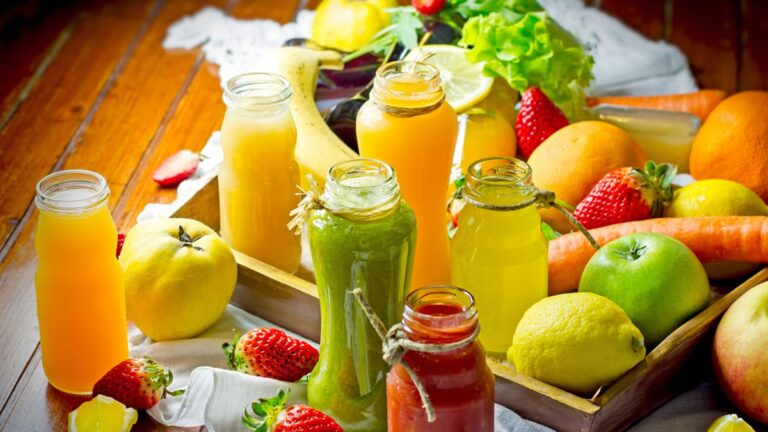Functional foods are defined as foods that provide health benefits beyond nutritional value and positively impact the body’s overall health and well-being. Functional drinks are gaining popularity because they are a convenient way to introduce health in non-alcoholic, easy-to-use, ready-to-use compositions. These can address personal health needs such as energy boost, stress relief, muscle building, and digestive issues, as well as more clinical needs to support disease treatment and recovery. The functional beverage industry is a rapidly growing sector, with specific nutrients such as antioxidants, dietary fiber, prebiotics, proteins, peptides, unsaturated fatty acids, minerals, and vitamins being developed to meet consumer needs. and bioactive compounds.
Please also read: Start your morning right! 5 nutritional drinks for healthy and glowing skin
Here are four functional drinks that are perfect for a healthy diet.
There are several types of functional drinks, including dairy-based drinks, probiotic drinks, energy drinks, sports drinks, meal replacements, caffeinated drinks, and vegetable and fruit drinks.
1. Functional water:
Water itself is a functional drink that supports life. Many producers are now adding flavoring ingredients such as spices and herbs to provide consumers with hydration and the benefits of these ingredients. Some add soluble hydrogen, oxygen, electrolytes, and vitamins for added health benefits. As we all know, water is the most important fluid for hydration and maintaining energy levels, and these additional ingredients make it even more beneficial.
Homemade functional water can be easily made using spices such as ajwain, coriander seeds and leaves, and cumin water. Cumin water has well-documented digestive benefits and a role in managing medical conditions such as diabetes. Simple fresh lemon water with salt is the best oral rehydration solution and is rich in natural vitamin C. Coffee and tea are probably the oldest known functional waters, with well-documented antioxidant and chronic disease prevention benefits. Sorbets made with bael fruit, panna, couscous, fermented kandji, and kombucha are also great options.
Also read: Drinking this cardamom water can do wonders for weight loss and detox.

Spiced water has many health benefits.
Image credit: iStock
2. Energy drinks:
These are the most popular functional drinks today and are used to maintain energy and combat the effects of a sedentary lifestyle. These drinks may contain caffeine, taurine, fat, fiber, and more. Many energy drinks also have added vitamin D and linoleic acid, which provide both nutritional and physiological benefits.
Homemade energy drinks contain water infused with adaptogens like ashwagandha and ginseng root to calm the body and mind. Rich in antioxidants and phytochemicals, coffee and tea are known to boost cognition and energy. Soups and juices made from blends of fresh vegetables and fruits contain antioxidants, minerals, vitamins, and fiber that boost your immune system and provide energy. Coconut water is the original energy drink.
3. Sports drinks or supplements:
These are more specific and correspond to desired outcomes. These typically provide carbohydrates, protein, and healthy fats and are designed to help athletes and physically active individuals recover from strenuous physical activity and build and repair tissue. Sports drinks may contain protein isolates such as whey or soy, certain amino acids, and creatine to help athletes achieve their nutritional goals for muscle and strength.
Homemade sports drinks can be made by adding fruits, seeds, and nuts to dairy products such as milk and yogurt. This blend provides all the nutrients in their natural form, as well as a variety of other health benefits, including protection against chronic disease, fiber, immunity boosting, and antioxidants.
4. Nutritional supplements:
These plant-based drinks are made with fruits, vegetables, soy, cocoa, and dairy and can help with specific health issues such as digestive disorders, skin health, brain health, metabolic balance, and immunity. I’ll deal with it. These meet the demand for natural foods that help protect against disease. Fruits and vegetables contain bioactive compounds known for their ability to protect against cancer, cardiovascular disease, diabetes, and urinary tract infections. Milk, tea, and coffee also contribute compounds that provide health benefits. Commercially available nutritional supplements separate these compounds to create a drink. Probiotic, prebiotic, and synbiotic beverages also fall into this category.
Homemade: Just enjoy the blended fruit, milk, chaas, lassi or tea/coffee to experience the benefits in their most natural form. What’s more, you can enjoy its rich flavor. Haldi water and ginger water boost immunity, while ashwagandha balances metabolism.
Functional drinks are here to stay. It is healthier compared to non-nutritive sugary drinks. All you have to do is choose according to your health goals and read the label carefully. Ideally, talk to your health care provider.
